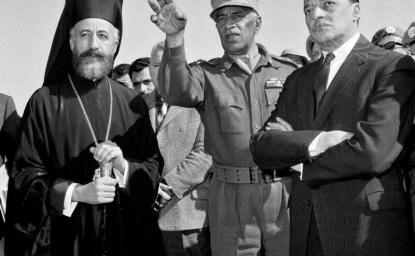 The Cold War International History Project and its Bulgarian partner, the Cold War Research Group-Bulgaria, are pleased to announce the publication of a new CD-ROM on "Bulgaria and the Cold War. Documents from Todor Zhivkov's Personal Records." Containing never-before published documents from the personal archive of Bulgaria's former Communist dictator Todor Zhivkov, (who was Eastern Europe's longest serving Stalinist leader), the collection covers the entire period of Zhivkov's reign from his election as Communist party leader in 1954 through the collapse of communism in Bulgaria in 1989.
The Cold War International History Project and its Bulgarian partner, the Cold War Research Group-Bulgaria, are pleased to announce the publication of a new CD-ROM on "Bulgaria and the Cold War. Documents from Todor Zhivkov's Personal Records." Containing never-before published documents from the personal archive of Bulgaria's former Communist dictator Todor Zhivkov, (who was Eastern Europe's longest serving Stalinist leader), the collection covers the entire period of Zhivkov's reign from his election as Communist party leader in 1954 through the collapse of communism in Bulgaria in 1989.
The CD-ROM contains more than 700 pages of documents (most in both Bulgarian and English) of previously unknown stenographic notes of Todor Zhivkov's conversations and correspondence with over 30 foreign state and political leaders from all five continents spanning over three decades. The documents contain new information, evaluations and assessments  highlighting various military and political conflicts in different "hot" spots throughout the world during the Cold War years.
highlighting various military and political conflicts in different "hot" spots throughout the world during the Cold War years.
The documents presented in a sampling (below) include a diverse array of conversations between the Bulgarian leader and foreign counterparts, including Italian Foreign Minister Aldo Moro (27 April 1970), US Undersecretary of State John Whitehead (4 February 1987), Acting Secretary General of the Chinese Communist Party Zhao Ziyang and Deng Xiaopeng (6-7 May 1987), and finally Greek Prime Minister Andreas Papandreou (22 April 1989).
Future document samplers from this collection to be published by CWIHP online will include one focused on events in the Middle East and in the Third World. Included in that collection will be conversations with Libyan leader Muammar Qaddafi, Syrian president Hafiz Al Assad, Palestinian leader Yasir Arafat, and many leaders of the leftist guerilla movements from the countries in Central America and Africa. Also among the documents in the collection are several classified government decisions to make arms deliveries to Third World countries and conversations between Zhivkov and heads of states of different countries asking for Zhivkov's mediation for arms deliveries from the USSR (Conversation with Assad and Qadaffi).
The documents give new evidence for the role Bulgaria played in regional conflicts throughout the period, in particular in the Six Day War in the Middle East in 1967, the Yom Kipur War in 1973, and the Turkish invasion in Cyprus in 1974.
 Another future presentation of documents from the collection will scrutinize Bulgaria's relationship with the Soviet Union. While frequently seen as the "yes-man" or "toadie" state in the bloc, Zhikov's conversations and correspondence with Brezhnev in 1973 and 1978/79 as well as with Chernenko in 1984 will highlight some of Zhikov's internal and privately aired disagreements with the Soviets. The documents also revel some of the methods he used to try to obtain from the Soviet leadership the concessions he most wanted.
Another future presentation of documents from the collection will scrutinize Bulgaria's relationship with the Soviet Union. While frequently seen as the "yes-man" or "toadie" state in the bloc, Zhikov's conversations and correspondence with Brezhnev in 1973 and 1978/79 as well as with Chernenko in 1984 will highlight some of Zhikov's internal and privately aired disagreements with the Soviets. The documents also revel some of the methods he used to try to obtain from the Soviet leadership the concessions he most wanted.
The CD-ROM collection was prepared by a group of Bulgarian scholars and archivists (Jordan Baev, Boyko Mladenov, Kostadin Grozev, Mariana Lecheva) in cooperation with the Central State Archive – Sofia and the Cold War International History Project. The collection's English language translations were edited by Nancy L. Meyers of CWIHP. The publication received financial support from the Cold War International History Project –Washington.
It was introduced to the Bulgarian public last fall during a visit to Sofia by CWIHP director Christian Ostermann, receiving widespread media coverage in all major Bulgarian newspapers and several radio and TV shows.
To read the sample documents, click here




